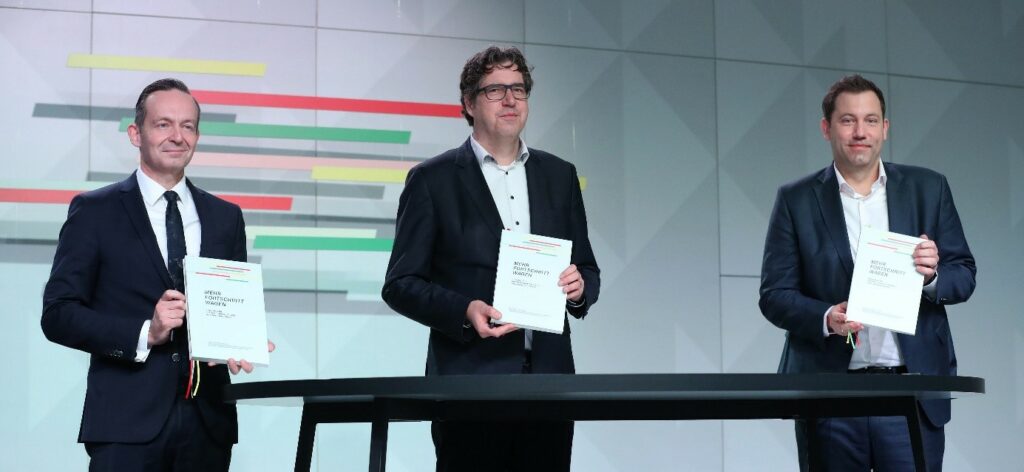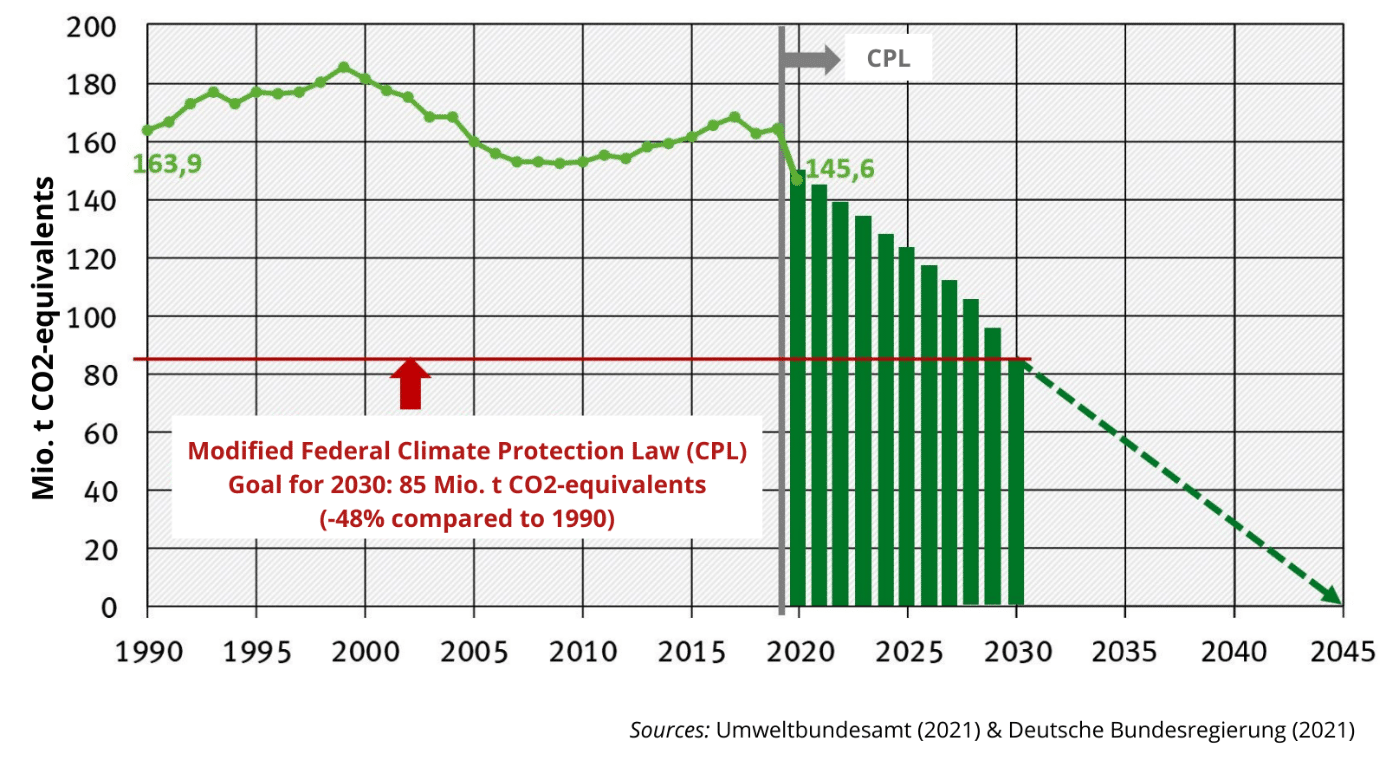
Authors: Sebastian Ibold and Daniel Bongardt
On December 8, 2021, a new German federal government was inaugurated. After 16 years of an administration led by the conservative party (CDU) with Mrs Angela Merkel as Chancellor, the new coalition of three parties consists of the Social Democrats (red), the Liberals (yellow) and the Greens forming a so-called “traffic light coalition”. This constellation is in place for the first time in German history. It is generally assumed as a progressive coalition that is envisaging major reforms in fields such as digitalisation, diversity and human rights and puts high priority on fighting the global climate crisis.
The partners have developed a 177-page coalition agreement in order to define a programme for the government work until 2025. The agreement is focusing on the green and zero carbon transformation of the German economy. Green recovery in the light of the ongoing COVID-19 pandemic and reforms in the energy sector (e.g. phase-out of coal and 80% renewable energy share by 2030) are less of an issue between the three partners.
Yet, when it comes to transport policy, things get a bit trickier . Different from other sectors, transport carbon emissions in Germany have – besides a pandemic-induced dip in 2020 – not been reduced in the last 30 years in absolute terms. At the same time, the German climate law sets a very ambitious goal of cutting emissions by almost 50% to 85 Mt CO2 in 2030 (162 Mt CO2 in 2019). This figure of the German Federal Environmental Agency visualises these transport GHG emissions and targets.

The agreement outlines the overall goal to use the 2020s for a departure in mobility policy and to enable sustainable, efficient, barrier-free, intelligent, innovative and affordable mobility. Even though transport is a key sector to reach the set climate targets, the seven pages-long section of the coalition agreement on transport is rather unspecific and lists more general targets that are envisaged. E.g. it is highlighted that step by step the fossil age shall be ended, but a phase-out date for the internal combustion engine is not included. Instead, the agreement refers to the plans of the EU Commission, according to which only CO₂-neutral vehicles will be allowed to be registered in Europe from 2035.
The low ambition is mainly based on a conflict between two parties; actually the liberals have prevented some strong measures suggested by the Green Party. For the time after 2035, the agreement states that only vehicles that can be fuelled with e-fuels can be newly registered. This might be understood as a move to extend the life of ICE vehicles. A general speed limit for Germany’s Autobahn, that Social Democrats and the Greens have suggested in the run-up to the election, is also not included. The Liberals vetoed this approach that could have been an effective and low-hanging fruit for road safety and emission mitigation.
Nevertheless, the agreement lists remarkable targets for various modes and areas. Here is a selection, a full list of the targets sorted by categories can be found here in this PDF:
The list includes important topics and opportunities for rail, public transport, active modes, e-mobility and digitalisation. However, it remains unspecific in many areas and hence gives quite some room for interpretation to the new Minister in charge. Surprisingly to many observers and to the expectation of the general public, it is not the Green Party but the Liberals who became in charge of transport in the new Ministry of Digital and Transport (BMDV; formerly BMVI).
The new coalition not just agreed on focus topics but also reformed the institutional set-up as part of a ministerial reshuffle. The BMDV – now headed by the liberal Mr Volker Wissing, a former Minister of Transport in the State of Rhineland-Palatinate – increased its competence in digitalisation (e.g. to further develop the mobility data space). The Liberals are traditionally closer to the car-industry and motorists than the Greens. However, they may be more progressive and reform-oriented than the conservative party CSU that was heading the transport ministry in the last 16 years.
The Ministry for the Environment, Nature Conservation, Nuclear Safety, and Consumer Protection BMUV (formerly BMU) had a strong role in pushing for environmental and climate rules in the past. Now, the new coalition has cut out large parts of its climate responsibility and moved it to the new centre of the green reform agenda, the Ministry for Economic Affairs and Climate Action (BMWi). It is headed by the green vice chancellor Mr. Robert Habeck and e.g. subsidies for electric vehicles are managed by this body. It will be interesting to see how the organisational units that have been struggling with conflicting interests (car-industry vs. climate goals) will now act.
As a side note, the responsibility for the international climate negotiations has moved from the Ministry for Environment to the Federal Foreign Affairs Office, headed by the green Annalena Baerbock, who was running for chancellor. Mrs Baerbock is now aiming at putting climate change at the heart of the German foreign policy. E.g. the coalition agreement is mentioning a so-called climate club that may become an important vehicle to drive ambitious climate action. In addition, the German embassies may increase their role in general climate diplomacy as well.
The new coalition stands for multilateralism, strengthening close cooperation with the European Union and engaging in the United Nations (UN). For example, it is clearly stated in the agreement that Germany will engage in “Team Europe” approaches and that the European Green Deal and related transport packages will be supported strongly.
The German Ministry for Economic Cooperation and Development (BMZ) will continue to push for achieving the Sustainable Development Goals (SDGs). It has established the Transformative Urban Mobility Initiative (TUMI) and funds several transport projects through its German Climate Technology Initiative (DKTI). The Ministry will continue to provide the bulk of the German Climate Finance.
The former Environmental Minister Mrs Svenja Schulze (Social Democrats) and her State Secretary Mr Jochen Flasbarth were newly appointed to the BMZ and it can be expected that they will continue to push for ambitious climate action. Both are very familiar with the challenge of decarbonising transport and Mr Flasbarth is a member of the Council of the German Think Tank Agora Verkehrswende, a long-time partner of GIZ. Agora advocates for transforming transport not only in Germany but at global scale.
A bit more uncertain is how the International Climate Initiative (IKI), the most important instrument utilised by the former BMU to support international climate action and biodiversity, will be deployed in the years to come. The IKI initiated many important transport initiatives in the transport sector, such as the Sino German Cooperation on Low Carbon Transport, the NDC Transport Initiative for Asia, the global TRANSfer Programm and many more.
Through these funds, GIZ was able to cooperate with countries like Chile, China, Colombia, Costa Rica, India, Indonesia, Kenya, Morocco, Peru, the Philippines, South Africa, Thailand, Tunisia and Vietnam on developing climate actions in mobility. The IKI may be transferred from BMUV to the BMWi or the Foreign Affairs Office and it remains to be seen if transport will even become more in focus in this new setting.
Overall, the new government will rather expand Germany’s environmental, climate and energy cooperation than cut funds. The coalition may use the German G7 Presidency in 2022 for an initiative to establish climate partnerships and an international climate club open to all countries and commits to fulfilling the pledge for the German share of the USD 100 billion of international climate financing within the framework of a coherent external climate policy and increase it in the long term.
Transport is a hard to abate sector, which is true for Germany but for developing and emerging countries, too. This makes global cooperation more necessary than ever before. International partnerships help to drive the needed change. Hopefully, Germany will engage more actively in international transport alliances such as those started at COP26. In international cooperation on transforming transport, it is clearly no longer only about presenting German technological and methodological solutions to the world. Instead, international peer learning and best practice exchange are as important for German stakeholders.
Whether transport will be a priority in international climate policy is difficult to predict and the new coalition may need some time to find a common position. But even though many things remain uncertain for the moment, one thing is for sure: GIZ will continue to support governments in building and reinforcing global partnerships aiming to achieve the goals of the Paris Agreement and the Sustainable Development Goals. Stay tuned and continue to follow us.
Published 20.12.2021
 Signing of the coalition agreement for the 20th election period of the Bundestag (Germany) at 7 December 2021. On the left Volker Wissing, the new Minister for Digitalisation and Transport.
Picture: Sandro Halank, Wikimedia Commons
Signing of the coalition agreement for the 20th election period of the Bundestag (Germany) at 7 December 2021. On the left Volker Wissing, the new Minister for Digitalisation and Transport.
Picture: Sandro Halank, Wikimedia Commons